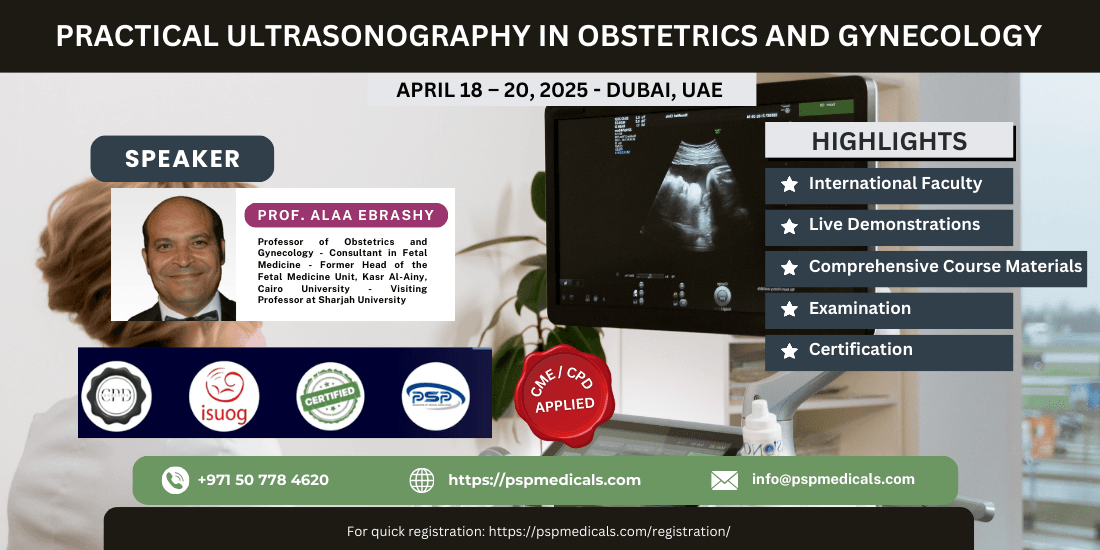

AO Trauma Course – Advanced Principles of Fracture Management 2025
AO Trauma Course – Advanced Principles of Fracture Management
Organized by: AO Trauma, AO Foundation
Dates: January 31 – February 2, 2025
Venue: Le Méridien Dubai Hotel & Conference Centre, Dubai, UAE
Description
This modular course builds on the foundational principles taught in the AO Trauma Basic Principles course and focuses on advanced operative fracture management techniques for complex injuries.
Each module features evidence-based lectures, practical exercises, and small group discussions to develop participants’ decision-making and management skills. Post-course online self-assessments and additional resources support ongoing learning.
Eligibility
Participants must have completed the AO Trauma Basic Principles course and actively engage in trauma management.
Goal
To enhance participants’ knowledge and skills in managing complex fractures using advanced principles and techniques.
Learning Objectives
By the end of the course, participants will be able to:
- Apply reduction techniques in fracture management with attention to soft tissues.
- Assess and treat complex diaphyseal and (peri)articular fractures.
- Demonstrate strategies for managing open fractures and soft-tissue injuries.
- Initiate appropriate care for patients with pelvic injuries and polytrauma.
- Identify and manage complications effectively.
Course Highlights
- Led by top national and regional faculty.
- Comprehensive modules:
- Module 1: Review of Principles and New Techniques
- Module 2: Upper Limb Injuries
- Module 3: Lower Limb Injuries
- Module 4: Polytrauma, Pelvis, and Acetabulum
- Module 5: Special Situations and Problems
- Designed for doctors in surgical training or those advancing their skills.
- Duration: 2–4 days.
- CME credits available (region-specific).
Practical Exercises
- Fixation of a proximal humeral fracture
- Fixation of a distal femoral fracture
- Bicondylar tibial plateau fractures
- Management of distal tibial fractures
- Reduction techniques*
- Fractures of the distal humerus*
- Fixation of an intra-articular distal radial fracture*
- Intramedullary (IM) nailing of the femur*
- Ring Fixator Montage Principles for Fracture and Deformity Treatment*
- Multifragmentary fractures of the calcaneus*
- Patient positioning workshop*
* Optional content: Available only in selected courses. Check your chosen date and location for the full program.
Small Group Discussions
- Reduction techniques: Concepts and application
- Upper extremity fractures: Decision-making and stabilization methods
- Fractures of the femur
- Fractures of the tibia, ankle, and foot
- Decision-making in difficult fractures and polytrauma*
* Optional content: Available only in selected courses. Check your chosen date and location for the full program.
Competencies
- Understand the concepts of stability, their impact on bone healing, and the application of implants to achieve appropriate stability.
- Plan treatment based on patient assessment, imaging, classification, and decision-making.
- Apply reduction techniques in fracture management while considering soft tissue preservation.
- Use implants effectively by understanding their properties and applying appropriate techniques.
- Assess and manage diaphyseal, articular, and periarticular fractures.
- Develop strategies for treating open fractures and soft-tissue injuries.
- Manage patients with polytrauma.
- Evaluate, classify, and create treatment plans for pelvic injuries and acetabular fractures.
- Identify risk factors, manage complications, and address bone union disorders.
- Recognize and manage special fracture circumstances.
Competency-Based Curriculum Development
Competency-based curriculum development focuses on designing educational programs around specific, measurable skills and abilities that learners are expected to achieve. This approach ensures that the curriculum aligns with practical, real-world outcomes and emphasizes mastery of essential competencies required for professional practice.
Key features include:
- Learning outcomes that are clearly defined and measurable.
- A focus on skill acquisition and application rather than just theoretical knowledge.
- Flexibility to accommodate varying learner progress rates.
- Assessment methods that evaluate proficiency in specific competencies.
This methodology ensures that participants are prepared to meet professional demands effectively and confidently.
Take the next step in your surgical career with this expertly curated course on advanced fracture management.


